KUALA LUMPUR, Malaysia — Ernest Mah only shares his sexual orientation with a few select people. He’s a 21-year-old English major at the Universiti Sains Malaysia (USM), where being gay is not something he openly discusses — not even with his twin brother.
At a café in his home state of Penang, Mah moves with a confident flair, but he said it’s conditional. “I have to make sure I don’t come across as too flamboyant or too gay,” he told NBC News. That’s just the way it is in Malaysia, Mah added, explaining Islam is paramount and homosexuality is hush-hush in the Southeast Asian nation.

But while talking about being gay in Malaysia is taboo, discussing how to change someone's sexual orientation or gender identity is not, and it's becoming more common. That’s why Mah was not surprised when he heard about a contest being held at his university that asked students to submit ideas on how to convert their lesbian, gay, bisexual and transgender peers.
The contest, which included the creation of posters, was part of a Back to Fitrah forum recently held at the university, which sought to help LGBTQ students who have "disorders in sexual orientation return to their natural instincts." Mah said it's a "pattern of conversation" that he knows all too well.
In the library of the university’s mosque, Abdul Hadi Radzi, a second-year English major at USM and one of the Back to Fitrah organizers, explained his goal for the event as “menyantuni LGBT,” which translates to “reach out to LGBT."
“We are trying to educate people,” he said. “This is our view to correct LGBT. Not to persecute. Not to condemn them.”
Thilaga Sulathireh, founder of the transgender advocacy group Justice for Sisters, said the “menyantuni” mentality is driving other anti-LGBTQ movements in Malaysia. USM’s event is one example of the trend she described as “dakwah” or conversion through Islam.
“It’s not an isolated incident,” she said. “It’s part of a series of anti-LGBT and state-sponsored things that are happening.”
Discrimination against LGBTQ people is "pervasive in Malaysia," according to Human Rights Watch (HRW), and the international human rights group reported "violence against LGBT people remains a serious concern" in the country.
"Numerous laws and regulations attributed to Sharia prohibiting a 'man posing as a woman,' sexual relations between women, and sexual relations between men effectively criminalize LGBT people," HRW stated in a report released this year.

Back to Fitrah was organized by the Muslim Students' Association and formally approved by the university. Posters for the event also included the logo for the country's Ministry of Higher Education.
While USM is not a religiously affiliated institution, like many parts of Malaysian culture, it’s colored by Islamic custom. This means for students at USM who oppose the Back to Fitrah message, speaking out could be seen as sacrilege. It could also get them in trouble with the university.
Sitting cross-legged in the grass next to the student activities center, one USM student spoke about the dangers of resistance on the condition of anonymity because she feared that sharing her identity along with her criticisms would make her a target for bullying, or even expulsion.
“Nobody can touch religion here,” she said, as the sounds of evening prayer drifted across the lawn. “I worked really hard to get into this university. I really don’t want to get kicked out.”
It is especially challenging to resist when justifications against homosexuality are grounded in law. In Malaysia, oral and anal sex are forbidden under Penal Code 377, the vestige of a British colonial legislation that calls these behaviors “against the order of nature” and makes them punishable with jail time. Malaysia is one of a few former British colonies that has not repealed the law.

Because religion and culture go hand in hand in Malaysia, LGBTQ discrimination at the state level trickles down to the public. “Menyantuni” was the theme for March 24's Back to Fitrah forum, but the underlying message was more insidious: Being lesbian, gay, bisexual or transgender is unnatural, and, like any sickness, it should be cured.
A religious scholar invited to speak about LGBTQ issues at the March 24 forum openly used the word “kunyit” during the event, which means turmeric in Malay, but is used as derogatory slang to describe gay men. That kind of language propagates in anti-LGBTQ pop culture and social media as well, with Twitter movements like #TolakLGBT, meaning “reject LGBT.”
While an event like Back to Fitrah is given an official seal of approval, events organized by the LGBTQ community are frequently shut down or forced underground. Instead of stomping out these discriminatory behaviors, Sulathireh from Justice for Sisters said conversations like the one sanctioned by USM only encourage further discrimination.
“There should be more education against bullying,” she said. “That’s not happening.”
Radzi said society’s growing openness toward homosexuality and gender expression in Malay society were the motivation for his Back to Fitrah event. “The LGBT community is brave enough to do their programs openly,” he said. “We don’t want more people to get involved with them.”
There are some pro-LGBTQ events and movements, along with efforts to counter anti-LGBTQ rhetoric in Malaysia. However, they are few and do not receive the institutional support that events like Back to Fitrah do. That’s why opposition to events like Back to Fitrah is tepid, both at USM and in Malaysia more broadly. USM students responded to the forum by forming a group called Celebrating Identities, but for now, their conversations are contained to Facebook and private WhatsApp groups.
Mah chose not to attend the Back to Fitrah forum, like most of his peers who opposed its message. He said he did not want to endure the bigoted, anti-LGBTQ comments that he expected to be pervasive at the event.
“You want to be able to truly be who you are,” he said. But most of the time, he doesn’t feel that’s possible in Malaysia. “I’m trying to walk on eggshells a little bit,” he added.

Fatimah Jamaludin, a biology student at USM and one of the Back to Fitrah poster-making contest winners, said she only wants to better understand her peers to help them feel peace.
“One thing that you can do to make your heart feel calm," she said, is to say "thanks to Allah, 'Allahu akbar,' 'Allah is great,' and that will make you feel peace," she said. Her poster shows one hand passing Tasbih prayer beads down to another hand wearing a rainbow-colored bracelet.
Radzi and his fellow Back to Fitrah organizers said their ideas for their LGBTQ peers are grounded in compassion.
“We want to help. We love them,” he said, adding that the organizers' efforts are part of being Muslim. For him, that means homosexuality is forbidden — end of story. “You don’t have a say about what the Quran says, you have to adhere to it," he explained.
But for Mah and his peers who oppose the Back to Fitrah message, this absolutism is the crux of the issue. They say it creates a one-sided stalemate that subjugates LGBTQ voices and forcefully removes them from the discussion. “Menyantuni” aside, they say it allows human rights abuses against LGBTQ people to persist in Malaysia under a divisive claim about what’s "normal."

